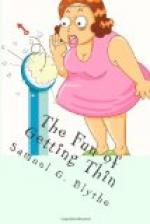The theory of taking off fat is the simplest theory in the world. It is announced, in four words: Stop eating and drinking. The practice of fat reduction is the most difficult thing in the world. Its difficulties are comprehended in two words: You cannot. The flesh is willing, but the spirit is weak. The success of the undertaking lies in the triumph of the will over the appetite. There’s a lovely line of cant for you! Triumph of the will over the appetite. It sounds like the preaching of a professional food faddist, who tells the people they eat too much and then slips away and wolfs down four pounds of beefsteak at a sitting. However, I suppose it is necessary to say this once in a dissertation like this—and it is said.
In writing about this successful experiment of mine in reducing weight I have no theories to advance except one, and no instructions to give. I don’t know whether my method would take an ounce off any other person in the world, and I don’t care. I only know it took more than fifty pounds off me. I am not advancing any argument, medicinal or otherwise, for my plan. I never talked to a doctor about it, and never shall. If there are fat men and fat women who are fat for the same reasons I was fat I suppose they can get thin the way I got thin. If they are fat for other reasons I suppose they cannot. I don’t know about either proposition.
I have great respect for doctors—so much respect, in fact, that I keep diligently away from them. I know the preliminaries of their game and can take a dose of medicine myself as skillfully as they can administer it. Also, I know when I have a fever, and have a working knowledge of how my heart should beat and my other bodily functions be performed. I have frequently found that a prescription, unintelligibly written but looking very wise, is highly efficacious when folded carefully and put in the pocketbook instead of being deposited with a druggist. I suppose that comes from a sort of hereditary faith in amulets. No doubt the method would be even more efficacious if the prescription were tied on a string and hung around the neck. I shall try that some time when my wife lugs in a doctor on me.
Still, doctors are interesting as a class. After you get beyond the let-me-feel-your-pulse-and-see-your-tongue preliminaries they are versatile and ingenious. Almost always, after you tell them what is the matter with you, they will know—not every time, but frequently. Also, they will take any sort of a chance with you in the interest of science. However, they generally send out for a specialist when they are ill themselves. When you come to think of it that is but natural. Almost any man, whether professional or not, will take a chance with somebody else that he wouldn’t quite go through with on himself. Besides, doctors treat comparative strangers for the most part, and the interests of science are to be conserved.




